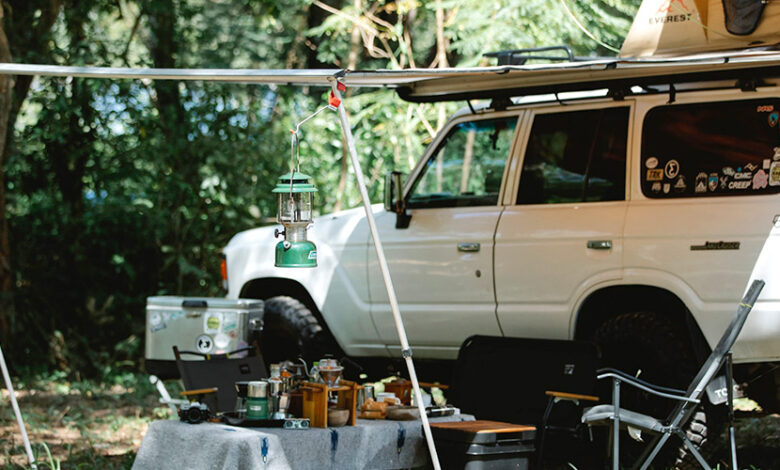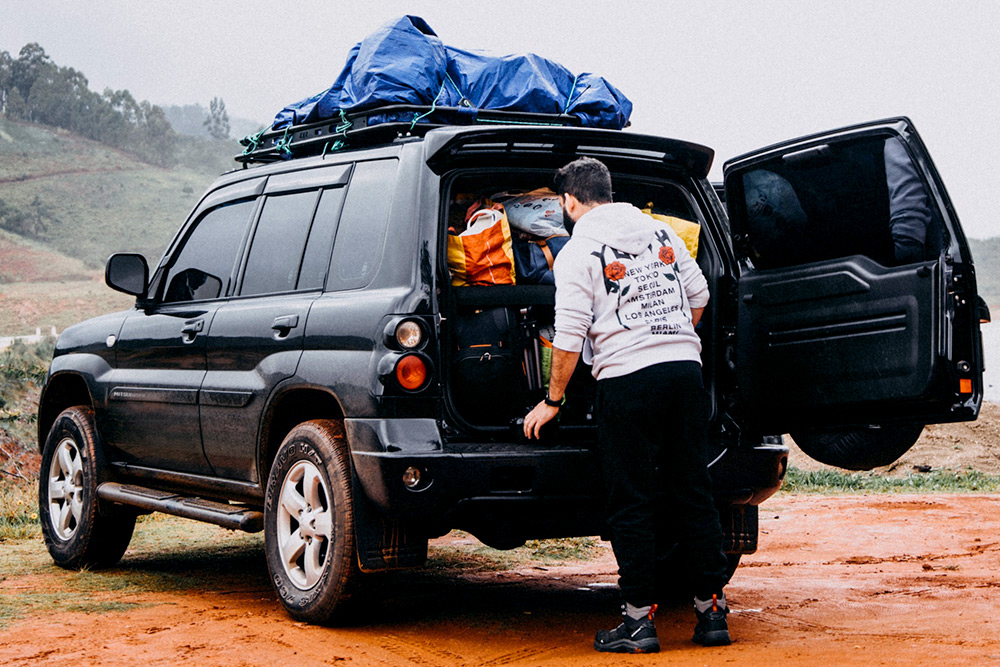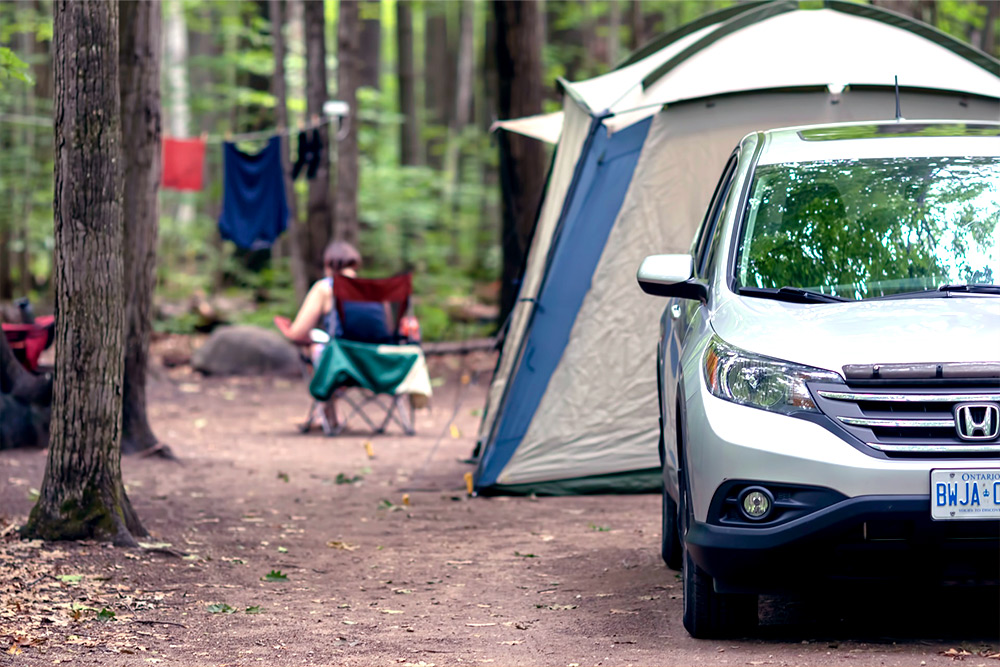Expert car camping tips – and how to avoid getting a fine
Editorial Feature

Car camping has become a fun new way for many people to experience the joys of an outdoorsy holiday in the UK. As well as the potential for budget-friendly travelling, car camping can be a great way to become more mobile and see more remote parts of the countryside that are easier to access by car.
This pastime has been growing in popularity recently, as shown by a 19% year-on-year increase in Google searches for ‘car camping’. If you’re thinking of getting in on this trend however, there are many things that you should consider before venturing out on your trip, such as where you are allowed to park, how to maintain your car on the road, and how to save fuel along the way.
Checklist has collaborated with car parts retailer GSF Car Parts to take you through everything you need to know in order to have the idyllic car camping trip you’ve been dreaming of.
Where can you go?
The first thing to decide is where you’ll be going. There are restrictions in the UK about where people can do what’s known as wild camping, which means pitching up outside a campsite, whether that be in your vehicle or in a tent. Working out whether you are allowed to pitch camp somewhere can be confusing, so make sure that you thoroughly research the laws in your chosen location prior to setting off.
Scotland
In Scotland, wild camping is legal in most areas, as long as you follow the behaviour set out in the Access Code. This makes the country a good destination for first-time wild campers, as there’s already plenty of information available to help you and it’s hard to go far wrong. Read the Scottish Outdoor Access Code for a practical guide to car camping and wild camping without a vehicle in Scotland.

England, Wales and Northern Ireland
While there are a couple of places in England where car camping is allowed, such as parts of Dartmoor and areas of the Lake District, these are the exception, rather than the rule. All other land in England, Wales, and Northern Ireland technically belongs to someone, and therefore you must have the permission of the landowner to camp there.
This means that it’s not usually possible for you to pitch up outside of camp sites — at least, not without the landowner’s consent. So, when car camping in England, Wales, or Northern Ireland, you should look up camp sites beforehand and find ones where you can pitch camp in a vehicle.
It is also possible to get permission from the landowner to wild camp on their land, but this is usually more time consuming as it can be confusing to work out exactly who owns which area. It’s usually easier to park within a camp site — unless you’re camping in Dartmoor National Park, which has some spots set aside for the pastime. You should also abide by some rules to leave nature as you found it, such as those outlined in the Lake District’s Guide to Wild Camping.
What happens if you park illegally?
There are a variety of penalties and punishments which may result from parking illegally on private land; many of which can be quite expensive.
This won’t be an issue in Scotland, as wild camping is legal on most public land. However, if you park on privately-owned land in England or Wales without express permission from the landowner, you will technically be trespassing. If the landowner catches you, then you’ll likely just be told to leave the property. But, if you fail to remove your vehicle from the area when asked, then the landowner may take civil action against you. If you continue to cause disruption or intimidation to the landowner, then you could be convicted of aggravated trespassing, a much more serious offence which can result in a fine of up to £2,500, or even a three-month prison sentence.
However, if you are a first-time offender, you’ll likely only be given a fine of around £200–£300. Nonetheless, no one wants to be landed with a fine on holiday, so make sure you check out your planned parking spot in advance and be respectful of the wishes of local landowners to ensure you are complying with the law.
If you are a fan of foraging, it’s also important to note that it is illegal to dig up any plants (including fungi, algae and lichen) from the land without permission from the landowner. So, you are allowed to pick leaves, berries and flowers where plentiful, but not to remove the entire plant by the root. If you are a keen forager, the Woodland Trust’s website has more specific advice on foraging.

Making your car comfortable
The next consideration in planning your trip should be how you can make sure that your car camping holiday is comfortable. If you are planning to sleep in your vehicle, you’ll need to ensure there is enough space for yourself and anyone who is joining you on your trip.
You’ll also need to keep in mind how you’re going to transform it into a comfy bed at night, and a relaxing seating area in the evening when you want to enjoy the view. Many accessories can help you set up camp:
- An awning: Having an awning to set up can help protect you from either the sun or rain, and create a bit of shelter from the wind too. This can also make your camp more homely, as you can place chairs and a table underneath it for sitting and taking in the view.
- An air mattress: While some people prefer to go with just a padded sleeping bag, having a small air mattress that fits inside your vehicle can make the camp more luxurious.
- Storage bags: You can also get special storage bags that will provide some waterproof carrying options to fit luggage into your car more neatly, so you can make the most of the space.
- A cooler: If you are travelling in the summer, being able to keep some food and water chilled is a real asset, and you can choose a cooler size that will fit easily into your vehicle.
Maintaining your car on the road
As well as preparing your car to be comfortable throughout your trip, you’ll need to make sure that you keep it well maintained so that you don’t find yourself breaking down or running out of fuel. Give your car a thorough check before setting off to ensure that everything is in working order, including the breaks, engine, and lights. Then, take the time to assemble a basic car maintenance kit for the road, which should include:
- Replacement oil
- A spare tyre
- Window cleaner
- Brake oil
- Jump leads
- A pump.
It’s also good practice to learn some basic car maintenance tasks before you head out, and to not take a long road trip until you are comfortable enacting some of these repairs yourself. Lastly, keeping your car well maintained at all times will mean you’re ready to venture out on a road trip with much less notice.
To see your company in any upcoming features we are arranging please email editorial@hurstmediacompany.co.uk






